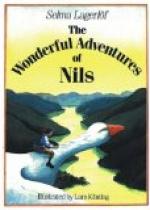But when the wild geese heard him laugh, they called out—kind o’ reprovingly: “Fertile and good land. Fertile and good land.”
The boy had already become serious. “To think that you can laugh; you, who have met with the most terrible misfortune that can possibly happen to a human being!” thought he. And for a moment he was pretty serious; but it wasn’t long before he was laughing again.
Now that he had grown somewhat accustomed to the ride and the speed, so that he could think of something besides holding himself on the gander’s back, he began to notice how full the air was of birds flying northward. And there was a shouting and a calling from flock to flock. “So you came over to-day?” shrieked some. “Yes,” answered the geese. “How do you think the spring’s getting on?” “Not a leaf on the trees and ice-cold water in the lakes,” came back the answer.
When the geese flew over a place where they saw any tame, half-naked fowl, they shouted: “What’s the name of this place? What’s the name of this place?” Then the roosters cocked their heads and answered: “Its name’s Lillgarde this year—the same as last year.”
Most of the cottages were probably named after their owners—which is the custom in Skane. But instead of saying this is “Per Matssons,” or “Ola Bossons,” the roosters hit upon the kind of names which, to their way of thinking, were more appropriate. Those who lived on small farms, and belonged to poor cottagers, cried: “This place is called Grainscarce.” And those who belonged to the poorest hut-dwellers screamed: “The name of this place is Little-to-eat, Little-to-eat, Little-to-eat.”
The big, well-cared-for farms got high-sounding names from the roosters—such as Luckymeadows, Eggberga and Moneyville.
But the roosters on the great landed estates were too high and mighty to condescend to anything like jesting. One of them crowed and called out with such gusto that it sounded as if he wanted to be heard clear up to the sun: “This is Herr Dybeck’s estate; the same this year as last year; this year as last year.”
A little further on strutted one rooster who crowed: “This is Swanholm, surely all the world knows that!”
The boy observed that the geese did not fly straight forward; but zigzagged hither and thither over the whole South country, just as though they were glad to be in Skane again and wanted to pay their respects to every separate place.
They came to one place where there were a number of big, clumsy-looking buildings with great, tall chimneys, and all around these were a lot of smaller houses. “This is Jordberga Sugar Refinery,” cried the roosters. The boy shuddered as he sat there on the goose’s back. He ought to have recognised this place, for it was not very far from his home.
Here he had worked the year before as a watch boy; but, to be sure, nothing was exactly like itself when one saw it like that—from up above.




